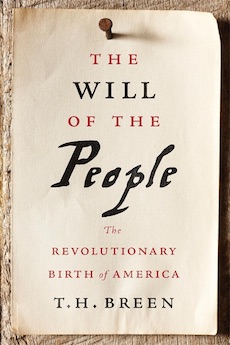By Louis J. Kern
What makes a revolution? Lauren Duca argues that it begins in our communities: “One statistically non-significant degree at a time, individual action builds to collective power. A revolution is the overthrow of the established hierarchy . . . revolution is a matter of regular people deciding that things can be different” (How to Start a Revolution: Young People and the Future of American Politics, 2019). Reading history “from the bottom up,” and in accord with Gerald Horne’s plea that “the heroic myth of the founding of the U.S. is desperately in need of revisiting” (The Counter-Revolution of 1776, 2014), Breen’s revisionist history of the American Revolution centers on the struggle for liberty and equality by the common people. Creation of the Association (1774, the first colony-wide boycott of British goods) gave ordinary people power to execute Continental Congress’ policies and unofficial police powers of enforcement. In conjunction with the committees of correspondence and the Committee for Defending and Detecting Conspiracies (uncovering and dealing with Tories and neutral citizens) local organizations dealt with the challenges of the politics of rebellion outside the context of the military arena. For most Americans, they were the experience of the revolution.
Breen provides an interesting alternative vision of the revolution by adopting a comparative perspective. Unlike the French and Russian revolutions there was relatively little popular vigilante justice, attainder, or property confiscation of ideological opponents. Maintenance of the rule of law and avoidance of anarchy dampered violence; concern for private property prevailed over desire for revenge.
Breen emphasizes the role of ministers in structuring the revolutionary response; indeed, he sees them as more important than formal revolutionary pamphlets, especially in their stress on the “appeal to heaven.” Apart from situating God on the revolutionary side, this locution “placed the burden of political judgment on the people,” helped keep revolutionary response within the bounds of lawfulness, and provided a sense of confidence in a period of dubious conflict. In fact, the population was seriously divided—about 40-45% were patriots, 15-20% were Loyalists, and 35-45% were neutral.
Consequently, local elected committees were tasked with ferreting out those not committed to the revolution. They relied on informants who turned in their neighbors, established informal hearings to examine the suspected, and incarcerated, at times in concentration camps, those found guilty. In general, however, they tempered their judgments with mercy, since disloyalty often encompassed familial ties and neighbors. Except for those who had taken up arms and killed patriots, local committees tended to be satisfied with confessions of error and oaths of allegiance to the united colonies. Such lenient policies tended to assuage fear and to preserve the rule of law and prevent anarchy and help to explain why ca. 400,000 returning Loyalists (16% of the U.S. population) typically retained their property.
Breen concludes that “a revolution waged in the name of the people had become the people’s revolution.” With the collapse of continental currency and massive inflation local citizens banded together to regulate prices and restrain war profiteers. But Breen’s liberal, innovative perspective is perhaps too sanguine a vision of the Revolution since it fails to take account of the elite propertied counter-revolution that secured national establishment—voting remained limited to property owners; the Senate was not popularly elected; and the electoral college privileged states over people. The promise of the Revolution has remained unrealized for 200+ years. For a more revolutionary view of the Revolution see Horne, who argues that prioritization of property protection “eventuated in a counter-revolution of slavery” that “gave slavery a renewed lease on life,” and established ongoing racial bias and discrimination.
Louis J. Kern (ΦBK, Clark University) is professor emeritus of history at Hofstra University. Hofstra University is home to the Omega of New York chapter of Phi Beta Kappa.




